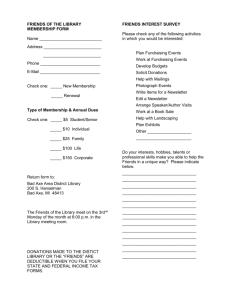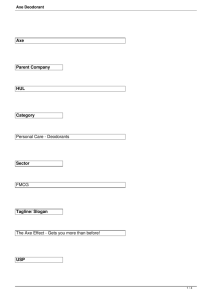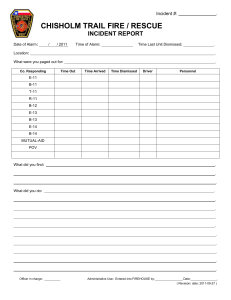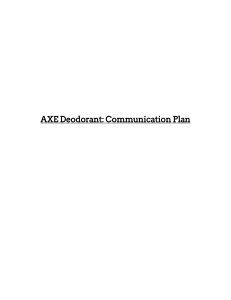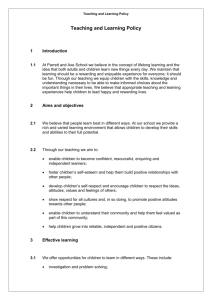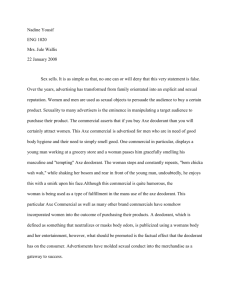to the IAA InterAd XII Case Brief
advertisement
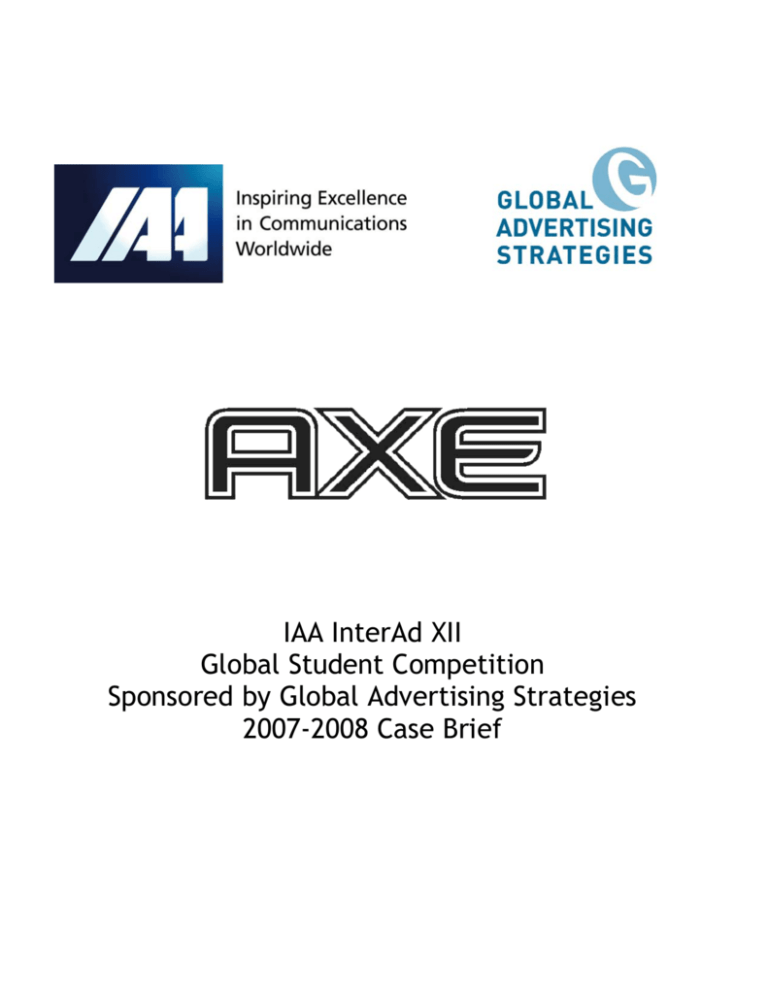
IAA InterAd XII Global Student Competition Sponsored by Global Advertising Strategies 2007-2008 Case Brief The IAA InterAd XII Global Student Competition Sponsored by Global Advertising Strategies 2007-2008 Case Project _____________________________________________________________________ Preface The International Advertising Association (IAA) is pleased to invite your participation in InterAd XII, its annual global student advertising competition. This year’s competition is sponsored by Global Advertising Strategies, and Unilever is the client. The enclosed case presents an actual marketing communications situation; whereby Unilever has achieved a unique position for its Axe brand of male grooming products. Notwithstanding, markets are dynamic! Consumers are fickle. Global marketers and regional producers are continually introducing new brands or repositioning existing lines; as fierce competitors they vie with one another for sales, and market share. As a consequence, successful marketers such as Unilever need to be alert to new market opportunities, where innovative marketing communication strategies and accompanying promotional tactics can generate incremental growth. InterAd XII provides a unique opportunity to address this matter--first by identifying one or more untapped ethnic multi-cultural markets within your country or region, and then by proposing a comprehensive integrated marketing communications plan that will resonate among the intended buyers/consumers. Participation in InterAd XII will also challenge you and your student colleagues to examine cultural values, ensuring that the resulting campaign proposal will be in accord with acceptable moral and legal standards prevalent within your country and throughout the region. In conclusion, IAA believes that InterAd participation will expand your marketing communications proficiencies—producing a professional quality Plans Book and accompanying presentation, while honing your capabilities in administering a demanding task. Beyond this, we think that it will additionally provide deeper insights into the profession. ______________________________________________________________________ Table of Contents Part I InterAd XII: Contextual Background From Ego to Axe Deodorants, Gels, and Bodysprays International Presence Promotion Sustaining Growth p. 1 p. 1 p. 1 p. 2 p. 2 p. 3 Part II InterAd XII: Challenge Addressing the Assignment Ethnic Markets in Perspective Developing an Effective Campaign Conducting a Situation Analysis Setting Basic Priorities Goals Developing Strategy Deriving Tactics p. 4 p. 4 p. 4 p. 5 p. 5 p. 6 p. 6 p. 6 p. 7 End Note p. 8 List of Figures Figure 1: Figure 2: Figure 3: Axe Bodysprays Axe’s Global Presence Axe Deodorant Global Sales & Market Share p. 1 p. 2 p. 3 The IAA InterAd XII Global Student Competition Sponsored by Global Advertising Strategies Part I InterAd XII: Contextual Background Unilever is one of the world’s leading manufactures and marketers of consumer goods, which comprises approximately 400 food, home, and personal care brands. The company has operations in around 100 countries with its products distributed in 50 more. The company employs 46,000; and in 2006 realized an operating profit of 2,178,000 euros, resulting from nearly 14 billion euros turnover. From Ego to Axe Unilever introduced “Ego” as a new deodorant targeted to South African males in 1974. The brand’s success prompted the company to roll out the brand into other international markets, where it would be promoted as “Axe”, or renamed “Lynx” for distribution in the UK, Australia and Ireland. Deodorants, Gels, and Bodysprays Today, Axe is the world’s most popular grooming brand. The line currently includes deodorants, bodysprays, and shower gels--each available in a wide assortment of seductive fragrances. Figure 1 highlights nine Axe bodysprays, viz. Orion, Clix, Essence, Phoenix, Touch, Vice, Tsunami, Kilo, and Unlimited. Axe stick deodorants and shower gels feature matching scents, or their own distinctive fragrance—Apollo, Groove, Marine, Musk, Recovery Re-load, Boost. Figure 1: Axe Bodysprays Axe packages are attractively designed--labels ordinarily include a uniform bar code, list ingredients, and a toll free number for addressing comments/questions; bodyspray and shower gel packages additionally note information re recommended usage/consumption. 1 International Presence Axe brand products are consistently targeted to 18-24 year old males. As illustrated in Figure 2, they are currently distributed in more than 40 countries. Figure 2: Axe’s Global Presence Figure 3, shown on the following page, presents Axe deodorant sales and market share data for 2005 and 2006 across 39 international markets. Not all Axe brand items/fragrances are marketed in all countries, or found in all retail outlets stocking the line. Promotion Unilever attributes Axe’s success to its tightly focused promotional efforts— dramatizing “Boy gets Girl” benefits resulting from product usage. Axe received Clio’s 2006 Advertiser of the Year Award for its creative leadership; with its edgy individual commercials receiving numerous creative prizes--including 10 Cannes Lions. Axe marketing emphasizes “on-line” promotions—web sites, instant messaging, blogs, and games. Additionally, Axe campaigns frequently involve collaborative promotions and orchestrated events carefully targeting adolescents and young adults. Taken together, Unilever’s highly innovative and imaginative promotional efforts have generated a distinct high profile Axe image, while furthering brand equity. Moreover, Axe’s promotions have contributed to extensive--positive and negative—press coverage and word-of-mouth communication both within and beyond its target market. 2 Sustaining Growth Axe has increased sales worldwide by successfully expanding distribution into one country after another; while the strategically timed introduction of new fragrances has increased overall market share. Notwithstanding, competition from global marketers, i.e., Procter & Gamble, as well as from regional producers either promoting their own brand and/or supplying “private label retailer brands” remains intense. As the market matures, Unilever must now address new market opportunities-specifically ethnic multi-cultural markets located throughout the world--where it can realize incremental sales. Figure 3: Axe Deodorant Global Sales & Market Share Figure 3 Axe Deodorant Global Sales & Market Share 2005 $ Sales (000) Axe Category Market Share 2006 $ Sales (000) Category Axe Market Share Argentina Australia Austria Belgium Bolivia Brazil Canada Chile Colombia Czech Republic Ecuador Finland France Germany Greece Hungary India Indonesia Italy Japan Mexico Netherlands Norway Peru Philippines Poland Portugal Romania Russia Saudi Arabia South Africa Spain Sweden Thailand Turkey United Kingdom USA Venezuela Vietnam 142,081 154,244 35,881 46,344 11,747 526,874 187,051 82,737 93,020 41,086 9,579 24,201 418,984 525,956 33,558 44,611 23,647 44,701 203,405 225,919 272,740 132,604 25,400 18,826 33,579 128,954 43,558 40,492 150,208 19,280 192,170 224,553 31,050 44,551 48,701 673,934 1,876,335 67,760 1,791 28,709 24,805 4,980 7,448 1,002 69,340 21,562 20,196 8,921 822 1,844 3,396 38,075 44,564 3,961 2,956 6,783 2,810 9,186 0 39,737 14,431 0 1,501 3,706 1,780 3,620 889 4,552 1,135 16,035 32,081 5,682 5,023 1,900 132,675 240,721 6,083 0 20.2% 16.1% 13.9% 16.1% 8.5% 13.2% 11.5% 24.4% 9.6% 2.0% 19.3% 14.0% 9.1% 8.5% 11.8% 6.6% 28.7% 6.3% 4.5% 0.0% 14.6% 10.9% 0.0% 8.0% 11.0% 1.4% 8.3% 2.2% 3.0% 5.9% 8.3% 14.3% 18.3% 11.3% 3.9% 19.7% 12.8% 9.0% 0.0% 173,652 161,621 37,924 49,072 12,034 571,291 191,845 91,152 100,768 48,334 11,439 25,432 427,019 563,766 34,358 48,027 30,267 50,787 211,010 227,972 292,907 140,649 24,740 21,660 32,883 147,213 45,579 49,103 170,304 23,019 210,857 244,548 32,096 49,643 51,498 706,940 1,915,640 84,631 2,361 35,080 28,447 5,258 8,395 893 66,374 22,193 21,505 10,053 1,023 2,055 3,161 40,534 50,507 4,125 3,199 8,667 2,637 8,028 0 46,233 15,274 0 1,322 3,435 1,202 3,705 1,129 6,313 1,637 17,561 35,028 5,754 5,426 2,009 138,008 257,773 9,570 0 20.2% 17.6% 13.9% 17.1% 7.4% 11.6% 11.6% 23.6% 10.0% 2.1% 18.0% 12.4% 9.5% 9.0% 12.0% 6.7% 28.6% 5.2% 3.8% 0.0% 15.8% 10.9% 0.0% 6.1% 10.4% 0.8% 8.1% 2.3% 3.7% 7.1% 8.3% 14.3% 17.9% 10.9% 3.9% 19.5% 13.5% 11.3% 0.0% World 6,902,113 812,911 11.8% 7,314,044 873,514 11.9% 3 Part II InterAd XII – Challenge The InterAd XII challenge is two fold: Identify ethnic market segments existing within your country or within the region, and Develop a comprehensive campaign proposal for furthering Axe’s market share by preparing specific promotional recommendations for generating incremental awareness, trial and sales within this segment. Proposed recommendations should cover a one year time period; viz., July 1, 2008 -June 30, 2009; and include budget estimates as well as guidelines for measuring the success of the proposed efforts. (Note: The campaign should promote the Axe line; individual messages may feature one or more Axe items, and/or highlight one or more of Axe’s existing fragrances.) Addressing the Assignment Unilever’s challenge requires careful attention to both: (1) ethnic market identification, and (2) a proven process for developing an effective marketing communications campaign proposal. (Note: Students attending schools located in countries where Axe is not currently sold, may elect to: identify an ethnic market located in their school’s country, or identify an ethnic market located in any other country in the geographic region where Axe is distributed.) Ethnic Markets in Perspective Essentially, ethnic markets are a specific culturally and/or linguistically defined market segment existing within a broader market. For example, the Turkish population residing in Germany, the Indian market living in the United Kingdom, Afrikaners in South Africa, the Cuban market prevalent in south Florida, or the overseas Japanese populations inhabiting Brazil and/or eastern Australia’s “Gold Coast”. Ethnic segments can be found in all geographic regions, but not necessarily in all countries. Consumers from such segments subscribe to traditional ethnic values, and exhibit strong brand loyalties. They seek, purchase, and consume those brands whose perceived image is compatible with their own self image—which frequently reflects their cultural heritage. Successful marketers targeting these segments often incorporate narrowly focused media platforms, “below the line” promotions, and events perceived as compatible with the consumers’ accustomed lifestyle and behavioral characteristics. The creative strategy generally prescribes culturally unique executions—while often requiring an efficient adaptation/translation of mainstream messages. 4 Do such markets exist in your country? If so, how best can they be described in terms of; their size and corresponding market potential; demographics; values and attitudes; media involvement—viewing, listening, or interactive; and consumption characteristics. Select the one you believe most promising; this segment becomes your target audience. If not, focus on those within your region, or in other parts of the world. Select the one you think most promising for accomplishing the client’s goal. Regardless of the team’s decision, clearly state the principal geographical area where the selected ethnic target market is located. Developing an Effective Campaign An effective campaign—one that really works-- does not begin with writing “creative” messages. Ads, commercials, and “below the line promotions” are tactics. Resist the temptation to focus on tactics, until you thoroughly understand what the assignment requires. Remember too, that creative marketing communications only work in one place: The “mind” of the consumer. Accordingly, advertising and marketing communications creativity must be disciplined to attract the intended message recipient, spark the appropriate response, and produce the desired results. The development of an effective integrated marketing communications plan— complete with detailed promotional recommendations; and the subsequent transformation of these into a well written Plans Book, and accompanying presentation involve process. Adherence to the sequential 5 step process presented below assures that the tasks necessary for successfully completing this assignment will be addressed. 1. Conducting a Situation Analysis A situation analysis is about “getting on top of the situation; rather than having the situation on top of you.” First, research the nature and structure of the market segment as described above; and also note its social, economic, and legal constraints; competitive conditions; and prevailing trends. Next conduct a thorough “SWOT Analysis”, identifying the brand’s strengths, weaknesses, opportunities, and threats operant within the chosen market. The budget for the proposed ethnic market campaign within your country or the one you choose should reflect the size of the selected market, its potential, and estimated brand sales. 5 It’s also useful to consider: advertising expenditure as a percent of sales, and what is appropriate for the category. During calendar year 2006 Axe Deodorant media expenditures across its top 15 markets varied considerably, the average expenditure approximated 10% of sales. Variations are the result of multiple factors – including market saturation, share, rank, and competitive activity; as well as media availability, coverage rates, and circulation within a given country. Advertising and marketing communications expenditures are investments; accordingly agencies frequently advocate above average promotional expenditures when developing new segments. And if you concur, do so; but remember to justify all proposed expenditures. (Note: The estimated costs for proposed individual media buys and other recommended promotions may be expressed in the local currency. Beyond this, please (1) highlight the conversion factor: 1 U.S. $ = for the currency being used; for example, if proposed rates are expressed in Euros, the conversion factor would be approximately: $1 US Dollar =.74 Euros; and (2) show the total proposed campaign expenditure in both the local currency and in US dollars.) 2. Setting Basic Priorities Resources are limited, and the proposed campaign extends from July 1, 2008 through June 30, 2009. Concentrate on what is important and possible. Priorities must be set! Properly sequenced recommendations lead to optimal outcomes. Generating “awareness” is paramount; and precipitates “trial”. And remember: Successful marketing communications agencies apply effort to opportunity. 3. Goals What specifically will your proposed one year campaign proposal seek to accomplish? Campaign goals should be realistic and attainable; they should also be quantifiable as well as capable of being measured. How would progress toward their achievement be measured? 4. Developing Strategy What must you propose to achieve the desired incremental results? Develop a powerful idea, and incorporate strong appeals relevant for the intended audience, the brand, and the current situation. At the start, it would be useful to “profile” the intended message recipient—buyer and/or consumer. Specifically, who is this person whom you really intend to attract, buy, and re-purchase the brand? Once profiled, develop an empathic relationship with this “person”—project yourself into his/her information processing style. 6 Pay close attention to proper brand positioning. What is the brand’s current image; and is it appropriate for the ethnic market? How is it positioned among competitive brands—more specifically how does its current image or desired image compare with that of competitors? Simple “brand mapping” may help you visualize a more appropriate image, and indicate what your specific promotional recommendations will need to convey. What is the most probable purchasing scenario? Planned or impulse; and what are the salient customer brand contact points for accelerating the desired outcomes. 5. Deriving Tactics Effective tactics flow from strategy. Proposed executions should be imaginative, resonate with the audience, and trigger the desired response. For maximum impact, tactics must be on target. They must also be on strategy, and timely delivered. Recommendations should reflect the client’s need for continuity over time, and across all proposed media, P. R., and “below the line” marketing communications efforts, as well as remain within budget. Are the proposed ads/commercials, on-line promotions, events, and collateral programs in accord with “The Consolidated International Chamber of Commerce Code of Advertising and Marketing Communication Practice?” Will the proposed recommendations prompt buzz, publicity, and facilitate positive word-of-mouth? Will the proposed creative executions further awareness and stimulate trial within the target audience? To do so: They must attract attention, hold interest, elicit desire, and encourage action. Has the proposal been integrated, coordinated, and synchronized? Will it produce synergy? Effective creative tactics complement and reinforce one another. 7 End Note Prior to undertaking Unilever’s challenge, please read carefully the InterAd XII Instructions and Guidelines. This companion document addresses student team eligibility and registration procedures, specifies deadlines for registration and submission of the completed entry, notes judging procedures, and describes prizes and awards. It further includes recommendations for building an effective student team, meeting deadlines and preparing a professional grade Plans Book and Power Point Presentation, as well as for submitting the requisite materials by the February 4, 2008 deadline. The IAA’s World Service Center and its 4,000 plus members worldwide wish you and your teammates great success in carrying out this demanding assignment. 8
